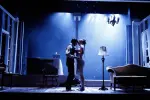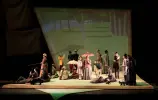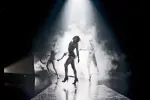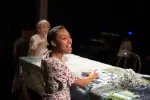Your Interview Jessica Greenberg
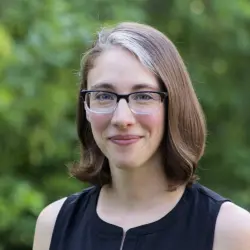
Jessica Greenberg
Designer, Educator
USA
Introduce yourself (name, company, position, country) and tell us how you got into lighting design (including education/qualifications).
My name is Jessica Greenberg, I’m a theatrical lighting designer and an Associate Professor of Theatre Design at Weber State University in Ogden, UT. I grew up in New York state and have worked with various performing arts companies and schools throughout the US. I got my start in lighting design by way of performing. I had always been very involved in theatre, and I started college thinking I wanted to become an actor or director. A friend of mine was producing a play he wrote and he needed some help with the lighting; I had no experience but volunteered anyway. That first production was a steep learning curve- but it was clear, I was hooked. I felt like I had discovered a language I didn’t know I spoke. I realized that storytelling through light was how I wanted to contribute to the theatre.
I have a BA in Theatre from Hampshire College and a MFA in Lighting Design from the University of Massachusetts. I’m a member of the United Scenic Artist union, Local USA 829.
Tell us about your work – is there a specific type of project you like to work on or an area you specialise in and why?
I design a wide range of performance projects in theatre, dance, opera, and site specific pieces in New York, Utah, and throughout the US. I especially enjoy designing new plays, or working on collaboratively devised pieces. I love to use light as a storytelling element on stage. In addition to teaching lighting at Weber State, I also do sound design and projection design for theatre.
What project are you most proud of and why?
I am both a designer and an educator, and I am thrilled when I can make connections between those two worlds. In summers 2018 and 2019, I collaborated with my friends at the NYC theatre company The Adjusted Realists to create an immersive professionalizing experience for my students. We co-produced a show in an off-broadway venue that featured technicians, assistants, associates, and design work by students working alongside seasoned professional artists. We were able to secure funding to cover housing and travel costs for the students to ensure cost was not a barrier to participation. The finished productions were polished and beautiful, and our students got an amazing experience.
What is the biggest challenge that you have overcome in your career?
As a first generation / working class college student, there were a lot of things I didn’t know about the culture and process of academia as well as professional theatre that I had to learn as quickly as I could. In the theatre industry, and surely many industries, networking through unpaid internships at prestigious companies or expensive graduate school programs are important stepping stones in early careers that are unfortunately hard to access for many of those who don’t come from families with financial security. As a young person, I worked hard to get good grades, and thankfully scholarships and financial aid helped pay my tuition. I contacted theatre companies and individual designers to create my own version of internships with them that fit my work schedule. I worked second jobs to help pay my bills when I was freelancing with small companies and building my first portfolio. I sought out graduate programs that offered assistantships to help fund my graduate work. Now in my career as an educator, I make it a point to help my current students connect to funding opportunities for scholarships, internships and assistant positions.
How does light inspire you?
I am inspired when lighting design blends seamlessly into a theatre production, when all the design elements and the performance move together in magical synchronicity. Good theatrical lighting design has a sense of breathing along with the actors, following the tenor of a scene and supporting the emotional context, or evoking environments. It also has a musical quality to me, with a sense of tempo, phrasing and pacing. Most audience members don’t consciously think about our lighting work, but I guarantee that all of them are affected by it.
What is your message for other Women In Lighting?
It’s true it can be intimidating sometimes to be a minority in any situation. I would say, remind yourself that you belong in the room. Be confident. Don’t let anyone bully you into thinking you are less than. Be kind. Treat everyone with respect. Be reliable and cool under pressure, and your work ethic will speak for you. Seek out mentors you trust. Don’t be afraid to create your own opportunities.
Weber State Outstanding Mentor Award for the College of Arts and Humanities (2016 & 2019)
Design Arts Utah Juror’s Award Winner (2016)
George & Beth Lowe Innovative Teaching Award (2018)
Lindquist Creative Fellowship (2018)
Browning Center for Design Fellowship (2019)
“Don’t be afraid to create your own opportunities. ”
Selected portfolio:

